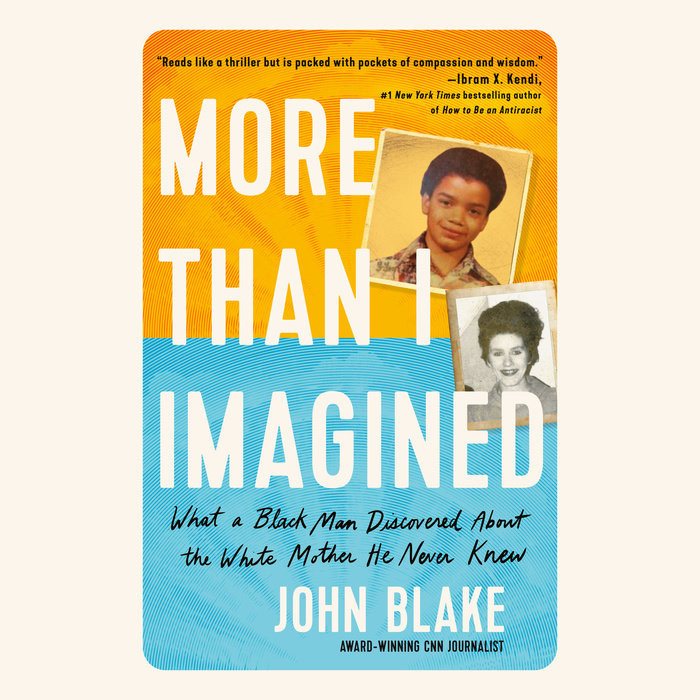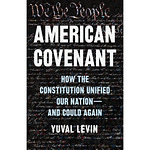Hello friends,
I don't know if I've ever read a book quite like John Blake's More Than I Imagined.
The subtitle is: What a Black Man Discovered About the White Mother He Never Knew.
I spoke with John this week and you can listen to our conversation above, on your computer, or on the Substack app on your phone, or on any of the many podcast platforms such as Apple podcasts.
John is a senior writer at CNN. In this conversation, John and I talk about:
his very difficult childhood growing up in West Baltimore in the 60's and 70's
how he grew up disliking white people even though his mother was white, in part because he was told after his mom disappeared that her family disliked black people
how meeting his mother at age 17 for the first time began to broaden his understanding of racial difference
his view that facts don't change people, relationships do
the point that an emphasis on relationships does not mean policy changes aren't necessary, or that everything can be fixed through relationships or interpersonal kindness
his wild ghost story
his roller coaster faith journey, and how interracial churches were the demonstration of faith's reality he needed to believe in Christianity
how there was a "golden age" of racial integration in America's schools from the early 70's to the late 80's, but how America believed a lie that it wasn't working and how we have now resegregated to 1968 levels, much of that due to our own choices
how he believes racial integration is crucial to how our country grows stronger, and how our pulling apart and into racial segregation is causing many of our problems
So, that's a lot. But here's the thing. This book is a great, great read. It's not a heavy lift. John is a great writer, and his story is incredibly personal and well told. It's riveting.
In this conversation we tease apart some of the more political aspects of his book, but the book is largely a story. You will enjoy it, and you'll probably share it with friends and family.
Interesting Reads
After the Pandemic: Loneliness, Belonging, and Rebuilding Our Civic Infrastructure, by Daniel Stid for The Art of Association
“The first of six pillars presented in the report to improve social connection is a call to “strengthen social infrastructure in local communities.” The key recommendations for making this happen include “design the built environment to promote social connection, establish and scale community connection programs, [and] invest in local institutions that bring people together.”
A subsequent recommendation for “what philanthropy can do” calls upon it to underwrite such efforts, both promising startups and established ones that merit scaling. Philanthropy can also fund public goods for the social connection sector in the form of evaluations, knowledge sharing, convenings, and communications platforms. (Let me share one unsolicited recommendation for funders here. Sponsoring biennial national surveys of the Belonging Barometer, with sufficient power to allow for local and state inferences, would be an exemplary contribution!).”
A Star Reporter’s Break With Reality by Elaina Plott Calabro for The Atlantic
All of which seemed to culminate in an appearance on Fox News—in November 2021, as the country battled COVID—during which Logan compared Anthony Fauci, then the director of the National Institute of Allergy and Infectious Diseases, to the Nazi doctor Josef Mengele. Fox stayed silent about the remarks but ultimately did not pursue a new season of Logan’s streaming show.
It was the sort of moment that those few friends left over from her old life thought might finally force a reckoning. Even her newer allies struggled to defend the remarks. (“Anytime you bring up a Nazi in anything, you’re kind of going off the reservation,” Ed Butowsky told me.) But by that point, Logan had come to seem firmly of the mind that setbacks, criticism, or a reproach of any sort were only evidence that she was doing something right. Carole Cooper, her agent—who, according to people familiar with their long relationship, had been like a second mother to Logan—dropped her. Less than a year later, Newsmax, where Logan often appeared on the commentator Eric Bolling’s weeknight show, washed its hands of Logan, following her riff on the global blood-drinking elite.
Logan was undeterred. The stakes, as she had come to see them, were simply too high. This is what she tries to communicate to people at the various local speaking gigs that now constitute much of her career, events such as the Park Cities Republican Women Christmas fundraising lunch in Texas, which she keynoted last year. “We had to cut her off because she was going too long,” one member who helped arrange the lunch recalled. The message was: “The world is on fire” and “your kids are being exposed to cats being raped” and “elections are stolen” and “we’ve lost our country.” The woman added, “It’s a Christmas lunch, mind you.”
In recent years, many Americans have embraced conspiracy theories as a way to give order and meaning to the world’s chance cruelties. Lara Logan seems to have done the same, rewriting her story as a martyrdom epic in the war of narratives.
Representation vs. Democracy: Not all representative bodies are democratic, and not everything should be democratized by Jonah Goldberg for The Dispatch
For very understandable reasons, we tend to confuse or conflate democracy and representation.
The thing about representation—or republicanism—is that it leaves room not just for things like compromise, buy-in, etc. It leaves room for better arguments to win. Everyone hates closed-door-meetings and backroom deals. We’re told that transparency is always better. But if the Constitutional Convention—the mother of all smoke-filled-room meetings—had been open to the public, they’d never have written the Constitution. The obsession with transparency is the tip of the spear of excessive democratization. To have a serious argument or negotiation you can’t have voters watching your every move. You need the freedom to offer concessions that your voters won’t like in the abstract in exchange for concessions your opponents’ voters won’t like. Behind closed doors, representatives can entertain new ideas and compromises.
Hyper transparency and democracy removes agency from the people tasked with doing what’s best for the country. We all understand this about all sorts of other important endeavors. No serious person would argue that generals should plan military maneuvers on C-SPAN. Who would want a surgeon to check with voters mid-operation? There’s a reason why judges will often meet with lawyers in their chambers and not in front of the jury. Every editorial board that spews out demands for more democracy and more transparency meets behind closed doors to debate the contours of the editorial. But for some idiotic reason we think politicians should behave like video game avatars of the most engaged and interested voters and viewers.
The people who disagree with me on this stuff will often get very pious about the righteousness of politicians doing whatever “the voters” want them to do. That’s democracy! Don’t you understand!? But most voters aren’t in fact paying close—or even any—attention to what happens in Washington. The “will of the voters” is a high-minded term for the will of a tiny sliver of voters and interests who want to keep politicians on their leash.
Let politicians have the power to make deals and decisions. Let them haggle. Give them the room to do what they think is best for the country and for the voters not paying much attention. In short, let them represent the interests of the country as they see them. And if—or when—they ultimately screw it up, vote them out. That’s what democracy is for.
It’s Not a Good Sign When People Who Don’t Pay for News Have So Little to Choose From, by Lydia Polgreen for The New York Times
Those who can afford and are motivated to pay for subscriptions to access high-quality news have a wealth of choices: newspapers such as The Times, The Washington Post, The Wall Street Journal and The Financial Times compete for their business, along with magazines such as The New Yorker and The Atlantic. Niche subscription news products serving elite audiences are also thriving and attracting investment — publications like Punchbowl News, Puck and Air Mail. The people who subscribe to these publications tend to be affluent and educated.
It bodes ill for our democracy that those who cannot pay — or choose not to — are left with whatever our broken information ecosystem manages to serve up, a crazy quilt that includes television news of diminishing ambition, social media, aggregation sites, partisan news and talk radio.
With all the layoffs, closures and bankruptcies it is hard not to feel that the old dream of digital news — lots of free, quality and diverse news from lots of different places — is mostly dead.
Espionage Act: How Trump's case stacks up against other alleged violations, by Jon Ward (me) for Yahoo News
Many people have been charged and jailed under the Espionage Act since it was passed in 1917, as the U.S. entered World War I.
But not every case is a good comparison with the charges brought against former President Donald Trump for holding on to top-secret files after leaving office.
Some people have been jailed for many years, or even for life, under the Espionage Act. Trump’s case is not in that category. If convicted, Trump would likely face no more than a few years in prison, if he faces any time at all.
… Many of the Espionage Act cases cited by special counsel Jack Smith and his team were prosecuted by Trump’s Justice Department.
In the five cases cited by the government for comparison with Trump’s, the average sentence was just over four years, Lawfare noted. But all five defendants pleaded guilty, which reduced their penalty.
If you want to read Trump’s indictment in the classified documents case, here it is.
That’s all this week. Have a great weekend!
Jon















Share this post